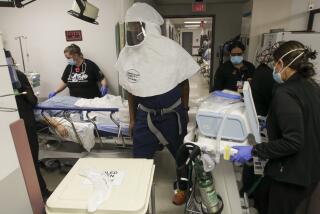Should Physicians Be Allowed Ignorance on AIDS? Of Course Not! But They Are
- Share via
For physicians the AIDS epidemic is medically complex, and, because it involves sex and premature death, it can be personally and emotionally threatening. This has led many--too many--physicians to avoid caring for AIDS patients and even to avoid identifying those of their patients who are at risk for AIDS. Acknowledging and overcoming this growing problem is an enormous but critical challenge for organized medicine.
The responsibilities of physicians in this epidemic can seem overwhelming: taking the patient’s sexual and intravenous-drug-use history; counseling low-risk behavior; discussing the pros and cons and limitations of the AIDS virus antibody test; counseling those who test positive or negative, or who decline the test; doing medical evaluations on those who test positive; recognizing early symptoms of AIDS; treating infections that have rarely been seen before, and caring for young people who are dying. Most physicians have had little training for this, so a great deal of new information and a great many new skills must be learned and applied.
Discussing sexual practices can be very difficult for physicians (as it is for non-physicians). An acquaintance of mine who is a very good surgeon takes extra precautions to protect himself when he operates on AIDS patients. But he doesn’t try to learn which of his other patients might be infected with the virus so that he could take the same precautions. Why not? “I can’t even talk about sex to my heterosexual patients,” he says.
A Times poll published in March showed that his response is typical: Nearly 85% of those surveyed said that no doctor had ever mentioned sexual practices to them (although 87% had visited a doctor’s office in the last three years).
The next area of reluctance involves the antibody test. It is complicated, different from any other blood test in medicine today. Obtaining written consent can be time-consuming and may raise questions that the doctor cannot answer.
Surgeons in particular want to know if their patients are infected with the AIDS virus, but many don’t want to be bothered by obtaining consent for the test. One surgeon has a novel solution: Before elective surgery he requires all of his patients to donate at least one unit of blood for themselves. Thus the hospital blood bank does the pre-test counseling and obtains the consent. Presumably the surgeon will be notified if the test is positive so that he can take extra precautions--or, perhaps, refuse to operate.
The California Board of Medical Quality Assurance sent basic information on AIDS to all physicians last month because of reports that “primary-care physicians are not recognizing the early (or even late) signs of infection with human immuno deficiency virus (HIV) and the various AIDS-associated illnesses to which the HIV-infected individual is prone.” Early recognition is extremely important in AIDS because the drug Retrovir (AZT) prolongs life and eases symptoms, especially when given to people with symptoms before the actual onset of AIDS. Additionally, medicines are now available to prevent pneumocystis pneumonia, the most common life-threatening infection in AIDS.
However, it is clear that just providing information will not persuade many physicians to assume their responsibilities--just as information alone does not always change high-risk behavior. Indeed, changing physician behavior has proved more difficult than changing sexual behavior. A survey of Sacramento physicians indicated that 35% would not care for patients with AIDS or infected with the AIDS virus; another 15% were undecided.
Thus, organized medicine--the American Medical Assn. and other national, state and local organizations together--must develop novel programs to teach physicians new skills. In medical school, students learn to do a physical examination first by being taught, then by practicing on other students, and then finally by examining patients. With AIDS, the same model must be used for physicians currently in practice.
The expected dramatic increase in the number of people with AIDS will overwhelm the capabilities of physicians who have borne the brunt of the epidemic until now. In Los Angeles 4,743 people have been found to have AIDS since 1981. It is estimated that by the end of 1991 that number will increase to between 20,000 and 44,000. Many--probably most--of those people are already being seen by physicians for commonplace medical problems. Their physicians should be able to diagnose HIV infections or AIDS early, and then provide the necessary counseling and care.
As physicians see the devastating effects of this virus on their patients, they will understand the need for prevention. When that happens, they must have the information and skills to provide counseling and treatment.
Organized medicine must respond now, before the problem becomes even more overwhelming, by developing and implementing programs and by ensuring that physicians avail themselves of these programs. As the Sacramento study indicates, physicians are not likely to take these programs voluntarily. But we cannot allow physicians to continue to sit out the epidemic of the century.






